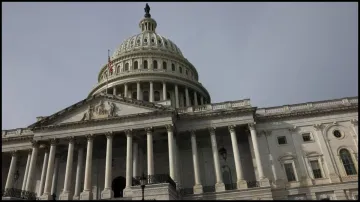Washington: The US Senate on Friday narrowly avoided a partial government shutdown by approving spending legislation for several government agencies just hours before the current funding was due to expire. The $467.5 billion spending package was passed by a vote of 75-22 in the Senate and now requires final approval by US President Joe Biden.
The legislation includes funding for agriculture, transportation, housing, energy, veterans and other programs through the end of the fiscal year on September 30. Funding for those programs was due to expire at midnight. The vote partially resolves a bitter, months-long battle over government spending that at one point left the Republican-controlled House of Representatives leaderless for three weeks.
"To folks who worry that divided government means nothing ever gets done, this bipartisan package says otherwise," Senate Democratic Leader Chuck Schumer said ahead of the vote. Some conservative Republicans in the Senate unsuccessfully pressed for votes on immigration and other topics, resulting in a delay at the upper house of the US Congress.
Republicans and Democrats clash
"I would urge my colleagues to stop playing with fire here. It would be irresponsible for us not to clear these bills and do the fundamental job that we have of funding the government. What is more important?” said Susan Collins, the top-ranking Republican member of the Senate Appropriations Committee.
The House Freedom Caucus, which contains dozens of the GOP’s most conservative members, urged Republicans to vote against the first spending package and the second one still being negotiated. Democrats staved off most of the policy riders that Republicans sought to include in the package like blocking expanded access to an abortion pill.
Republicans were able to achieve some policy wins, however. One provision, for example, will prevent the sale of oil in the Strategic Petroleum Reserve to China. Another policy mandate prohibits the Justice Department from investigating parents who exercise free speech at local school board meetings. Another provision strengthens gun rights for certain veterans.
The bill also includes more than 6,600 projects requested by individual lawmakers with a price tag of about $12.7 billion. The projects attracted criticism from some Republican members, though members from both parties broadly participated in requesting them on behalf of their states and congressional districts.
Future hurdles
Congress must still work out a deal on a much larger package of spending bills, covering the military, homeland security, health care and other services. Funding for those programs expires on March 22. Taken together, the two packages would cost $1.66 trillion. Far-right Republicans had pushed for deeper spending cuts to tame a $34.5 trillion national debt.
All these measures were supposed to have been enacted into law by October 1, 2023, the start of the 2024 fiscal year. While Congress rarely meets that deadline, the debate this year has been unusually chaotic. Congress so far has had to approve four temporary funding bills to keep agency operations limping along at their previous year's levels.
(with inputs from agencies)
ALSO READ | US Congress passes third stopgap bill to avoid government shutdown, awaits Biden's nod
Latest World News
